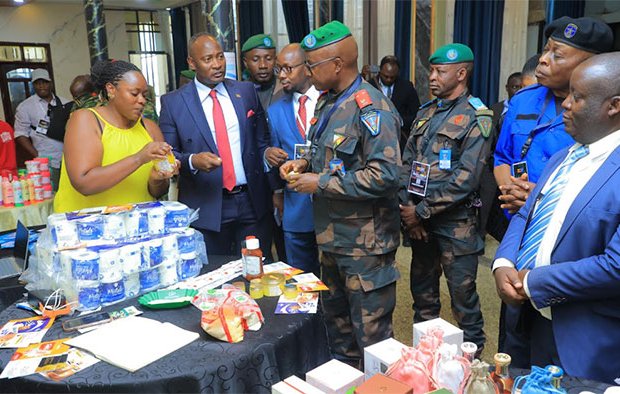Butembo, DRC — Uganda and the Democratic Republic of Congo (DRC) have taken another major step toward strengthening regional trade ties, hosting a two-day Business Connect Forum and Expo in Butembo, North Kivu Province.
The event, organized by the Uganda Embassy in Kinshasa in collaboration with both public and private sector partners from the two countries, ran under the theme “Strengthening Business Linkages for Socio-economic Transformation.” It aimed to deepen trade partnerships and promote investment opportunities between Uganda and DRC.
Senior government representatives from both nations discussed existing trade barriers and explored practical strategies to create a sustainable, business-friendly environment.
Representing the DRC were Julien Paluku, Minister of External Trade; Evariste Somo Kakule, Governor of North Kivu Province; and Sylvain Kanyamanda Mbusa, Mayor of Butembo. The Ugandan delegation included Gen. Wilson Mbasu Mbadi, Minister of State for Trade; Amb. Alhajji Farid M. Kaliisa, Uganda’s Ambassador to Kinshasa; as well as senior officials from the Ministry of Trade, Industry and Cooperatives, the Private Sector Foundation Uganda (PSFU), and the Uganda National Chamber of Commerce and Industry (UNCCI).
The forum attracted over 50 Ugandan enterprises across diverse sectors ranging from agriculture, pharmaceuticals, and cosmetics to construction materials, apparel, and dairy products. Exhibitors from cities including Beni, Butembo, Kisangani, Goma, and Bukavu engaged in networking sessions aimed at fostering long-term business linkages.
Butembo, the second-largest city in North Kivu, plays a vital role in trade between the two countries. Uganda’s strategic location continues to position it as a key gateway for goods entering and leaving eastern DRC.
Supported by the European Union and TradeMark Africa (TMA), both nations are implementing the Peaceful and Resilient Borderlands Programme a regional initiative designed to transform cross-border trade into a catalyst for peace, inclusion, and economic development. The program promotes regional integration, empowers small-scale traders, and facilitates the free movement of goods and people across shared borders.
Infrastructure remains central to this collaboration. Uganda and DRC are jointly constructing key transport corridors, including the Mpondwe/Kasindi–Beni (80km), Beni–Butembo (54km), and Bunagana–Rutshuru–Goma (89km) roads. Once complete, these roads are expected to cut transport costs, improve market access, and stimulate economic activity across both nations.
Trade statistics reflect this momentum. According to the Uganda Bureau of Statistics (UBOS), Uganda’s exports to DRC have nearly doubled from US$432.4 million in FY2016/17 to US$981.5 million in FY2024/25. DRC’s exports to Uganda have also surged, rising from US$23 billion in 2020 to US$59.8 billion in 2024 growth attributed to improved security, upgraded transport infrastructure, and DRC’s admission into the East African Community (EAC).
Ambassador Farid Kaliisa noted that with ongoing strategies and reforms, Uganda’s exports to the DRC could reach US$2 billion in the next few years.
At the forum’s opening, leaders from both nations emphasized that sustainable peace and security remain essential for trade to thrive. They also called for the removal of non-tariff barriers (NTBs) including complex administrative procedures and discriminatory tax practices that continue to hinder the free flow of goods and services across their shared borders.
